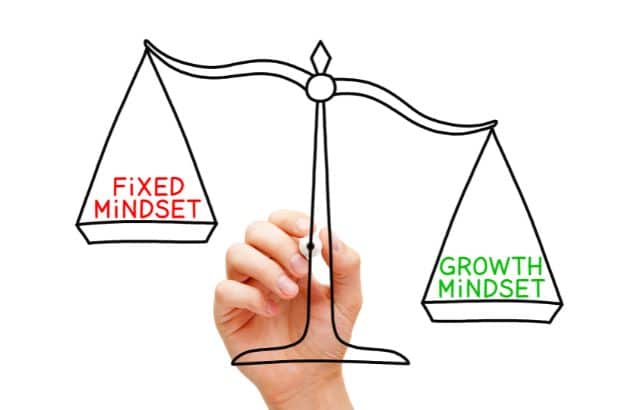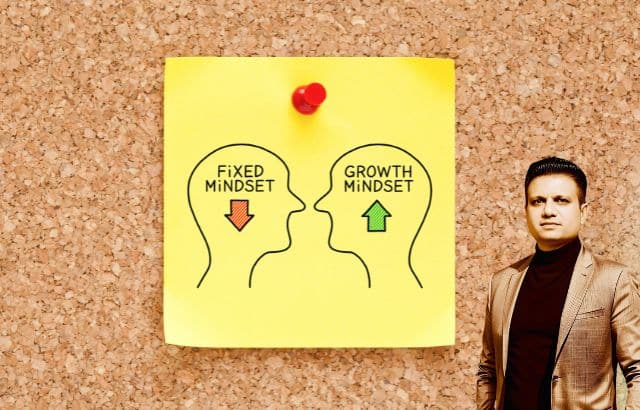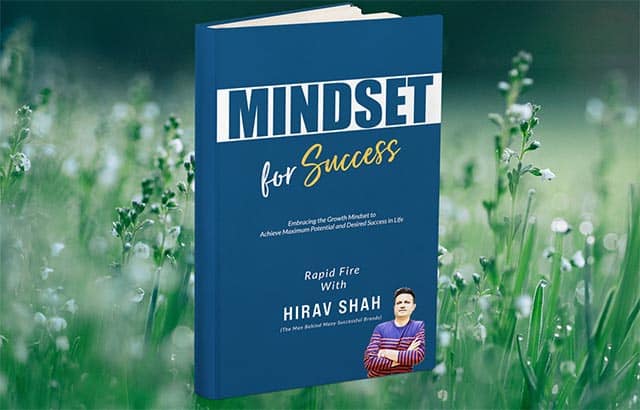Do you have a fixed mindset or a growth mindset? Your mindset can have a significant impact on your personal and professional growth.
Understanding the difference between a fixed mindset and a growth mindset can be life-changing. Your mindset determines how you perceive challenges, setbacks, and opportunities. As Hirav Shah aptly puts it, “Your mindset is the foundation of every success or failure. A growth mindset transforms obstacles into stepping stones, while a fixed mindset turns them into roadblocks.”
In this guide, we’ll explore the key differences between fixed mindset and a growth mindset and how adopting a growth mindset can transform your life.
Table of Contents
Fixed Mindset Vs Growth Mindset – What is a Fixed Mindset?

- A fixed mindset is the belief that your abilities and intelligence are fixed traits that cannot be changed or developed.
- People with a fixed mindset often avoid challenges, give up easily, and feel threatened by the success of others.
- They believe that their abilities are predetermined and that there is little they can do to improve them.
- This mindset can limit personal and professional growth and lead to a lack of motivation and resilience.
Fixed Mindset Vs Growth Mindset – What is a Growth Mindset?

- A growth mindset is the belief that your abilities and intelligence can be developed through hard work, dedication, and perseverance.
- People with a growth mindset embrace challenges, persist through obstacles, and view failure as an opportunity to learn and grow.
- They believe that their abilities can be improved with effort and that they can achieve their goals with the right mindset and strategies.
- This mindset can lead to greater personal and professional success, as well as increased motivation and resilience.
Hirav Shah’s Perspective
“Whether in business, sports, or life, a growth mindset leads to breakthroughs. Success isn’t reserved for the gifted; it’s achieved by those who are willing to grow, adapt, and persevere.” – Hirav Shah
Real-Life Example: Michael Jordan
Michael Jordan, one of the greatest basketball players of all time, is a prime example of the growth mindset. Despite being cut from his high school basketball team, he used this setback as fuel to improve. Jordan’s relentless practice and determination transformed him into a legend.
As Jordan once said, “I’ve failed over and over again in my life. And that is why I succeed.”
Fixed Mindset vs. Growth Mindset: Key Differences
| Aspect | Fixed Mindset | Growth Mindset |
|---|---|---|
| Challenges | Avoided | Embraced |
| Effort | Seen as fruitless | Seen as essential |
| Feedback | Ignored or taken personally | Used for improvement |
| Success of Others | Felt as a threat | Seen as inspiration |
The Benefits of a Growth Mindset.

- Adopting a growth mindset can have numerous benefits in both your personal and professional life.
- People with a growth mindset are more likely to take on challenges and persist through obstacles, leading to greater achievement and success.
- They also tend to have higher levels of motivation and resilience, as they view failure as an opportunity to learn and grow.
- Additionally, a growth mindset can lead to greater creativity and innovation, as individuals are more willing to take risks and try new things.
- Overall, embracing a growth mindset can lead to a more fulfilling and successful life.
Fixed Mindset Vs Growth Mindset – How to Develop a Growth Mindset.

Steps to Develop a Growth Mindset
- Embrace Challenges
View challenges as opportunities to learn. For example, instead of fearing a difficult project, see it as a chance to gain new skills. - Learn from Feedback
Constructive criticism can be a powerful tool for improvement. Instead of feeling defensive, ask yourself, “What can I learn from this?” - Persist Through Setbacks
Remember, failure is a stepping stone to success. As Hirav Shah says, “Every setback is a setup for a comeback.” - Celebrate Progress
Focus on the journey, not just the destination. Recognize and celebrate even small improvements.
Interactive Self-Assessment: What’s Your Mindset?
Take this quick quiz to determine whether you have a fixed or growth mindset.
Question: How do you react to failure?
- A: Avoid trying again because you’re afraid of failing (Fixed Mindset)
- B: Analyze what went wrong and try again with a better strategy (Growth Mindset)
Overcoming Obstacles to a Growth Mindset.

- One of the biggest obstacles to developing a growth mindset is the fear of failure.
- Many people with a fixed mindset avoid challenges and risks because they are afraid of making mistakes or looking foolish.
- However, failure is a natural part of the learning process and can actually be a valuable opportunity for growth and improvement.
- Another obstacle is the belief that talent and intelligence are fixed traits that cannot be changed.
- This can lead to a lack of effort and a reluctance to try new things.
- By recognizing and challenging these limiting beliefs, you can begin to develop a growth mindset and achieve your full potential.
How a Growth Mindset Can Transform Your Life
- In Business: Leaders with a growth mindset innovate and adapt, staying ahead of the competition.
- In Relationships: A growth mindset fosters better communication and problem-solving.
- In Personal Development: It enables continuous learning and self-improvement.
Hirav Shah’s Quote for Transformation
“A fixed mindset limits your potential. A growth mindset unlocks doors you didn’t even know existed.” – Hirav Shah
Books to Develop a Growth Mindset
Reading is one of the best ways to nurture a growth mindset. These books offer practical insights, inspiring stories, and actionable steps to help you embrace challenges and unlock your potential:
- Mindset: The New Psychology of Success by Carol Dweck
This groundbreaking book introduces the concepts of fixed and growth mindsets and provides strategies to develop the latter for success in all areas of life. - Grit: The Power of Passion and Perseverance by Angela Duckworth
Angela Duckworth explores how persistence and resilience can help individuals achieve long-term success, regardless of talent. - Atomic Habits by James Clear
Learn how small changes in your habits can lead to remarkable results and foster a mindset of continuous growth. - The Power of Now by Eckhart Tolle
This transformative book teaches the importance of mindfulness and being present, which are essential for embracing a growth-oriented perspective. - Mindset for Success by Hirav Shah
Hirav Shah shares powerful insights and proven strategies to help individuals break free from limitations, overcome obstacles, and adopt a growth mindset for unparalleled success. “Your mindset is the foundation of every success or failure. Transform your thinking, and you transform your life,” he emphasizes.
Interactive Element: What’s Your Mindset? (Self-Assessment Quiz)
Take this quick quiz to discover whether you have a fixed mindset or growth mindset. Choose the option that best describes your usual response to each scenario.
Question 1:
How do you respond to criticism?
- A) I avoid or feel offended by it. (Fixed Mindset)
- B) I analyze it and try to learn from it. (Growth Mindset)
Question 2:
When faced with a challenging task, what’s your approach?
- A) I give up easily if it feels too hard. (Fixed Mindset)
- B) I see it as an opportunity to improve. (Growth Mindset)
Question 3:
How do you view the success of others?
- A) I feel threatened or compare myself negatively. (Fixed Mindset)
- B) I feel inspired and motivated to try harder. (Growth Mindset)
Question 4:
What’s your attitude toward effort?
- A) If I have to try too hard, I assume I’m not good at it. (Fixed Mindset)
- B) I believe effort is key to mastery. (Growth Mindset)
Results:
- Mostly A’s: You lean towards a fixed mindset. Don’t worry! Acknowledging this is the first step toward growth. Explore the strategies in this article to shift your perspective.
- Mostly B’s: You have a growth mindset! Keep nurturing it by embracing challenges and continuing to learn.
Interactive Element: Growth Mindset Challenge
Ready to develop a growth mindset? Try this 7-Day Growth Mindset Challenge:
Day 1: Identify a recent failure and write down what you learned from it.
Day 2: Tackle a small challenge you’ve been avoiding and focus on the learning process.
Day 3: Ask someone for constructive feedback and list how you’ll use it to grow.
Day 4: Celebrate a success story from someone you admire and note how it inspires you.
Day 5: Try something new outside your comfort zone and reflect on the experience.
Day 6: Replace one negative thought about yourself with a positive affirmation.
Day 7: Write a list of three ways you’ve grown in the past week.
Fixed Mindset vs Growth Mindset: Frequently Asked Questions
What is a fixed mindset?
Answer: A fixed mindset is the belief that abilities and intelligence are static and cannot be changed or developed over time.
What is a growth mindset?
Answer: A growth mindset is the belief that abilities and intelligence can be developed through dedication, effort, and continuous learning.
How can a growth mindset benefit personal and professional development?
Answer: A growth mindset encourages resilience, adaptability, and a willingness to learn from mistakes, leading to continuous improvement and greater achievements.
What are common characteristics of a fixed mindset?
Answer: People with a fixed mindset tend to avoid challenges, give up easily, ignore feedback, and feel threatened by others’ success.
What are common characteristics of a growth mindset?
Answer: People with a growth mindset embrace challenges, persist through obstacles, value feedback, and find inspiration in others’ success.
How can I develop a growth mindset?
Answer: You can develop a growth mindset by embracing challenges, seeking feedback, viewing failures as learning opportunities, and committing to lifelong learning.
Can someone have both fixed and growth mindsets?
Answer: Yes, individuals can exhibit both mindsets in different areas of their life. The goal is to recognize and shift towards a growth mindset more consistently.
What role does self-talk play in mindset?
Answer: Self-talk significantly influences mindset. Positive, growth-oriented self-talk fosters a growth mindset, while negative, limiting self-talk reinforces a fixed mindset.
How does a growth mindset impact leadership?
Answer: Leaders with a growth mindset inspire and motivate their teams, foster innovation, encourage risk-taking, and create a culture of continuous improvement.
What impact does a fixed mindset have on relationships?
Answer: A fixed mindset can lead to rigid thinking, lack of empathy, and resistance to change, which can negatively affect personal and professional relationships.
How can educators promote a growth mindset in students?
Answer: Educators can promote a growth mindset by praising effort, encouraging persistence, teaching the value of mistakes, and fostering a love of learning.
What are some common myths about the growth mindset?
Answer: Common myths include the belief that a growth mindset is only about effort, that it is inherently positive, or that it is a fixed trait rather than a dynamic practice.
How does a growth mindset contribute to innovation?
Answer: A growth mindset encourages creative thinking, experimentation, and learning from failures, which are crucial components of innovation.
Can a growth mindset improve mental health?
Answer: Yes, a growth mindset can improve mental health by reducing stress, enhancing resilience, and fostering a positive outlook on personal growth and development.
How do fixed and growth mindsets affect goal setting?
Answer: A fixed mindset may lead to setting safe, easily achievable goals, while a growth mindset encourages setting challenging goals and viewing obstacles as opportunities for growth.
Can someone with a fixed mindset develop a growth mindset?
Answer: Yes, by practicing self-awareness and adopting habits that encourage growth, anyone can transition from a fixed to a growth mindset.
How does a growth mindset benefit entrepreneurs?
Answer: A growth mindset helps entrepreneurs embrace innovation, learn from failure, and persist in achieving their goals.
What is the biggest challenge in shifting to a growth mindset?
Answer: Letting go of the fear of failure and embracing the idea that effort and persistence lead to success.
How can parents encourage a growth mindset in children?
Answer: Praise effort over results, encourage curiosity, and teach kids that mistakes are part of learning.
Are there any books to help develop a growth mindset?
Answer: Yes, “Mindset: The New Psychology of Success” by Carol Dweck is a great starting point.
Fixed Mindset Vs Growth Mindset – Final Lines

The battle between a fixed mindset and a growth mindset determines the trajectory of your life. While a fixed mindset keeps you stuck in limitations, a growth mindset opens doors to endless possibilities. Through persistence, learning, and self-belief, you can transform not only your mindset but also your destiny. As Hirav Shah says, “The future belongs to those who choose growth over stagnation.”











